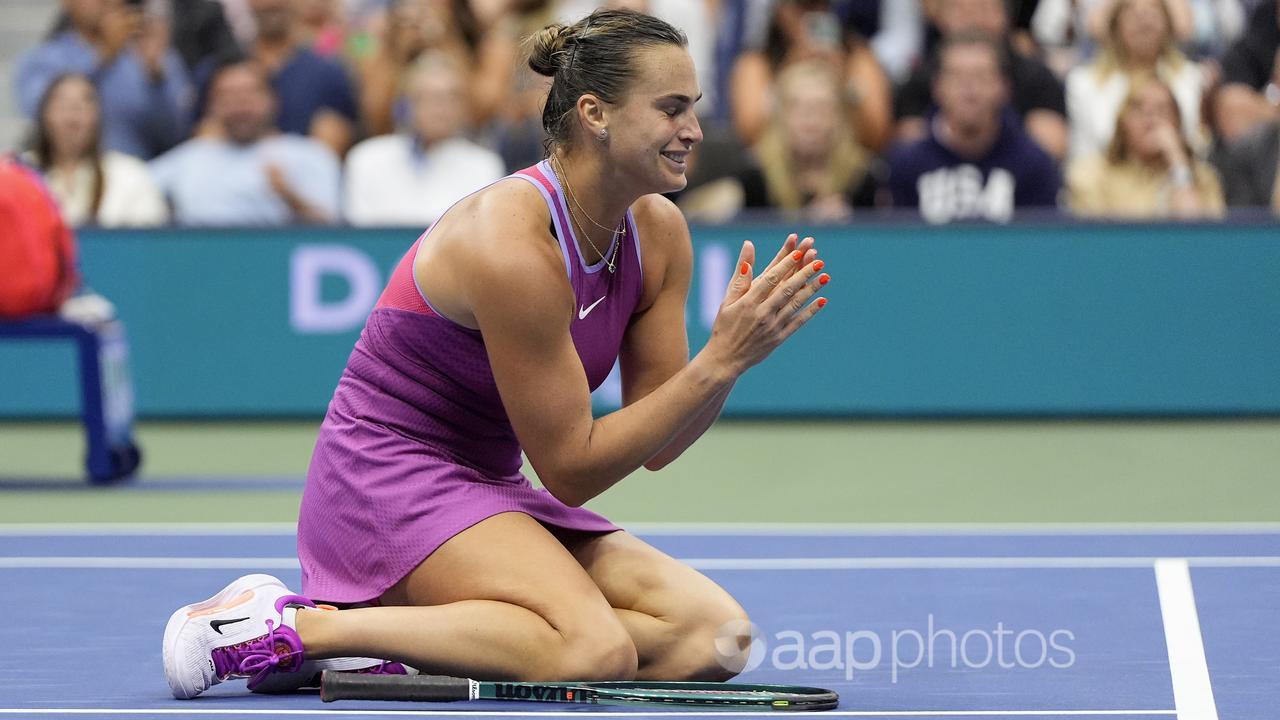Aryna Sabalenka left the US Open in tears 12 months ago as the runner-up. She exited in the semi-finals each of the two years before that. This time, the Belarusian was in a joking mood after winning her first championship at Flushing Meadows and the third grand slam title of her career.
The world No.2 got past sixth seed Jessica Pegula 7-5 7-5 in a rollicking final under a closed retractable roof at Arthur Ashe Stadium on Saturday, adding this triumph to the two she earned at the Australian Open each of the past two seasons, also on hard courts.
“Oh, my God. I’m speechless right now, said the 26-year-old, who is on a 12-match winning streak.
“So many times, I thought I was so close to get a US Open title. It’s been a dream of mine. Finally, I got this beautiful trophy. It means a lot.
“I remember all those tough losses in the past here.”
That includes in the semis in both 2021, against Leylah Fernandez, and 2022, against world No.1 Iga Swiatek.
Most poignant, of course, was last year, when Sabalenka was rattled by the crowd, blew a set advantage and was defeated by Coco Gauff. Like Gauff, Pegula is an American, but the spectators were far more generous towards Sabalenka this time, applauding her best efforts and even obliging when she waved her arms to ask for extra noise.
Pegula, whose parents own the NFL’s Buffalo Bills and NHL’s Buffalo Sabres, was participating in a major final for the first time at age 30. She’s won 15 of her past 17 matches over the past month but both losses came against Sabalenka.
To the native New Yorker’s credit, she did not fold after Sabalenka reeled off five consecutive games to grab the opening set and move ahead 3-0 in the second. In the next game, Pegula dropped a point and showed her frustration by whacking a ball off the video wall behind the baseline, dislodging a little square panel.
Maybe that released some tension, because suddenly she asserted herself, using her own five-game run to go up 5-3. But when she served at 5-4 with a chance to force a third set, Pegula let Sabalenka level the second with a break.
“Was able to find some good tennis, just wasn’t quite able to sustain it,” Pegula said.
“She played some big tennis in big moments.”
Indeed, that began a three-game surge for Sabalenka, who soon was collapsing to the court, dropping her racket and covering her face with both arms.

Once Sabalenka got going, once her booming strokes — her forehands were the fastest of the past two weeks — it became apparent the outcome would be determined by what she did.
By the close, the statistics made that obvious. Sabalenka finished with far more winners than Pegula, 40-17, and also more unforced errors, 34-22.
“She’s super powerful. Goes for her shots. She’s definitely not going to give you anything,” Pegula added.
“I was happy I was able to fight back and give myself a chance, but in the end it wasn’t enough.”
A year ago, Sabalenka blew that lead against Gauff. The year before, she blew that lead against Swiatek.
Didn’t let it happen again.
“In that second set, honestly, I was just praying there,” said Sabalenka, who collected a $US3.6 million ($A5.4 million) winner’s check.
“I was literally standing there and praying.”




















